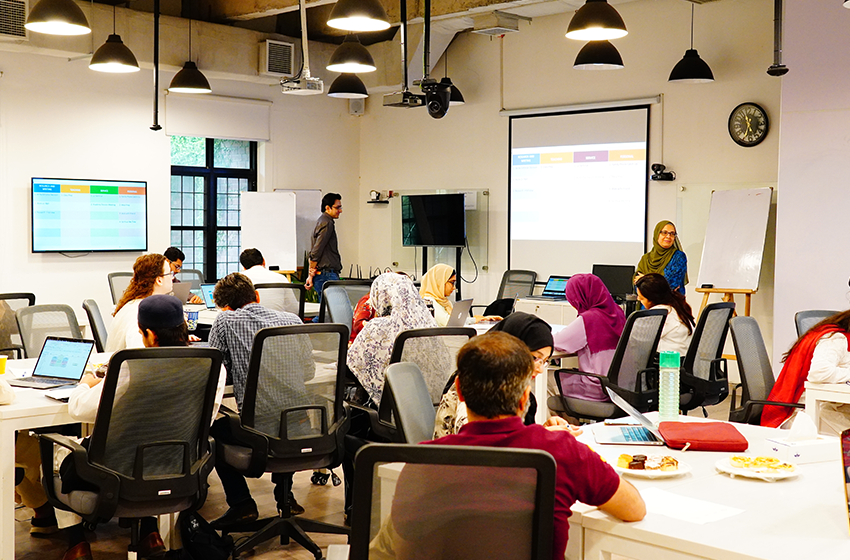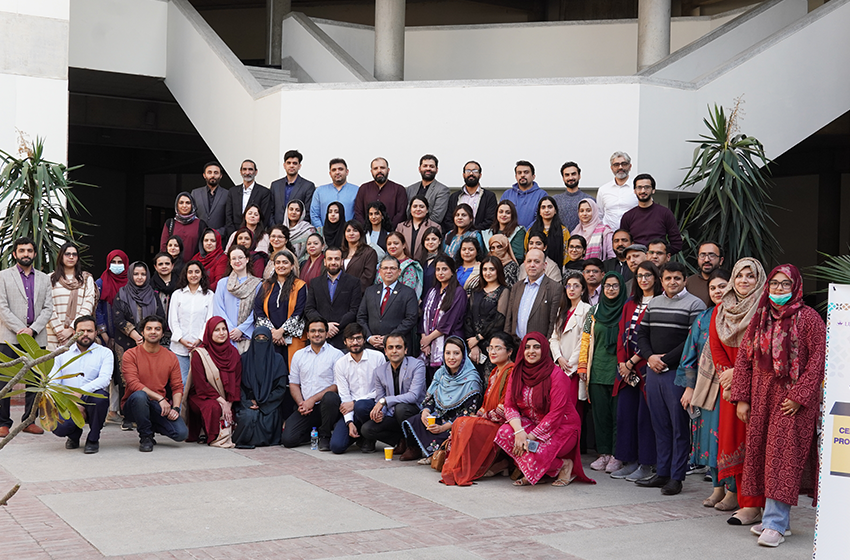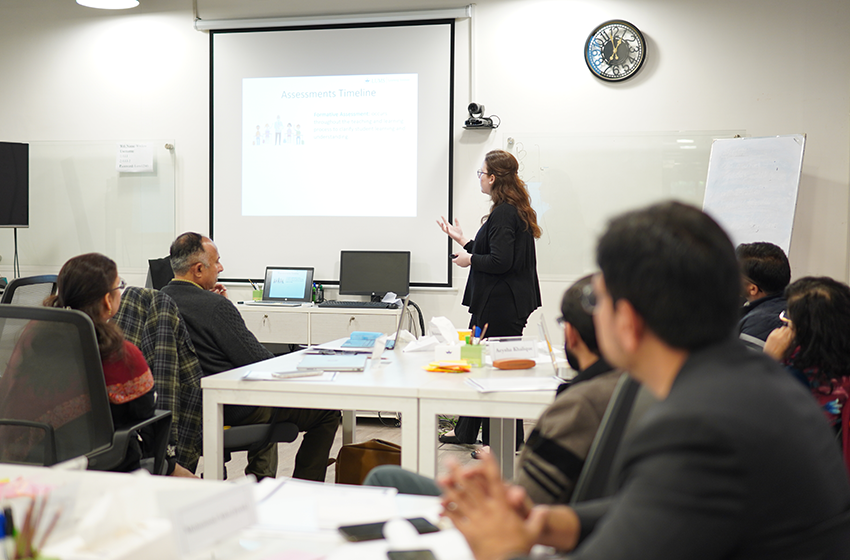The LUMS Learning Institute (LLI) is a development centre at LUMS, dedicated to enhancing teaching, learning, and career progression within the higher education sector – faculty, staff, and students alike. Over the last five years, LLI has distinguished itself by offering a wide range of developmental programmes that have significantly impacted learning and development, both within and outside of LUMS. LLI’s contributions to organisational excellence can be viewed in terms of its efforts to enhance teaching and learning, policy framework, evidence-based academic problem solving, and expanding its impact beyond borders through strategic collaborations.
Highlights
Teaching & Learning
LLI empowers LUMS faculty with cutting-edge pedagogical strategies, offering workshops on instructional skills, course design, and integrating peer feedback to improve student learning. It has also collaborated with faculty members to create discipline-specific learning experiences in areas such as Economics, Law, Business, Languages, and Data Science, which have contributed to enriching the academic environment at LUMS. LLI’s flagship programme, the Faculty Certificate of Teaching and Learning (FCTL) is a competency-based professional development programme designed to help faculty master instructional skills, develop or redesign courses, leverage peer observation and feedback to improve course delivery and technique, and build skills around tech and AI to enhance the teaching and learning process.

LLI also supports the faculty at LUMS in navigating key academic challenges through the Faculty Success Series (FSS), a year-long programme comprising a series of interactive, one-hour workshops on topics like time management, stress, mentorship, and work-life balance, the programme fosters personal and professional growth in a supportive, peer-driven environment. This initiative has created a valuable space for faculty to gain practical tools, share experiences, and connect with academic leaders.
Other than faculty-facing development initiatives, LLI also plays a vital role in empowering students with lifelong skills that may enable them to become resourceful professionals of the future. Students are involved in the Pedagogical Partnerships Programme, wherein LLI facilitates students through a semester-long partnership with a faculty member, contributing to course content, delivery, and assessment tool development. The students work – not as TAs or RAs – but as equal partners in the learning design process, incorporating their perspective into the learning process. The TA Development Programme is another prime example of how LLI empowers teaching assistants to support faculty and peers effectively, through close collaboration with LUMSx. The course has been made mandatory for all TA applications by SBASSE and SDSB.

Research and Evidence-based Problem Solving
Students as Co-Researchers (SCR) programme is a collaborative effort between the Office of Research (OR) and LLI to support students as co-researchers with faculty. The SCR programme aims to promote a culture of scholarly activities amongst undergraduate students who have completed their junior year and are starting their senior year and are interested in pursuing their own research projects, in collaboration with a LUMS faculty member and mentors from industry/partner organisations. The funding for these projects can be used for summer research projects or SPROJs.
To measure the impact of LLI’s internal offerings, the team has been conducting monitoring, evaluation and learning (MEL) activities for the overarching flagship programme, The Faculty Certificate in Teaching and Learning (FCTL). This research project aims to evaluate the effectiveness and impact of LLI by assessing how well it meets its internal goals and aligns with the needs of its beneficiaries—faculty, students, and other stakeholders.
Using classroom observations, surveys, and interviews, the study explores how the internal programmes influence instructional practices and student learning outcomes. It also identifies areas for improvement, highlighting barriers to programme effectiveness and opportunities for targeted interventions. The findings will inform the LLI’s End of Year Impact Report, helping shape future strategies through evidence-based, context-sensitive insights that strengthen teaching and learning at LUMS.
The team also aims to measure the impact of the Data Science module of the Certificate in Health Professions Education (CHPE), a certificate programme offered to medical professionals. The primary feedback collected through the programme reveals the upskilling of these medical professionals as a direct impact of the data science module. Through this research, the LLI team led by Dr. Ihsan Ayyub Qazi, the module instructor, aims to delve deeply into the participants’ experiences in order to gauge the nuanced impact of data science skills in their respective medical domains.
The Institute is also spearheading a focused research initiative this year through a problem-driven research programme to address a set of urgent and evolving learning challenges at LUMS. In close collaboration with the faculty and the university leadership, four critical problems have been highlighted: in-person class absenteeism, the decline of reading and attention, the impact of generative AI on learning, and the limitations of current grading practices. Four teams comprising faculty members, LLI staff, and research assistants aim to generate rigorous, context-specific evidence and actionable insights to strengthen teaching and learning at LUMS. By aligning research efforts with institutional priorities, this initiative seeks to inform meaningful pedagogical and policy innovations that foster deeper learning, equity, and student engagement.
Strategic Collaborations to Extend Learning Beyond Borders
The quality and impact of our offerings have earned us recognition not just in LUMS but also among audiences beyond our borders. The Certificate of Health Professions Education, a six-month long hybrid learning experience in collaboration with HSA, Islamabad, is a flagship programme at LLI, exemplifying our expansion into healthcare education. With its third iteration currently underway, the programme has trained over 170 doctors and health professionals in instructional skills, AI, Data Science, Ethics, Leadership, and Clinical Research, further demonstrating LLI’s commitment to interdisciplinary learning and development.

The pedagogical and innovative support has also extended to the law professionals through LLI’s bi-annual offering, Designing and Teaching Effective Law Courses: Pedagogical Training for Legal Academics in collaboration with the Directorate of Legal Education, Pakistan Bar Council (DLE), and the Shaikh Ahmad Hassan School of Law (SAHSOL) at LUMS. The offering seeks to train instructors of law from across the country in pedagogy and course design.
Another collaborative initiative at LLI is the Diploma in Healthcare Ethics and Professionalism (DHEP), offered in conjunction with the Bioethics Department of Shalamar Medical and Dental College. This one-year programme is designed to address critical ethical challenges faced by healthcare professionals in Pakistan, encompassing areas such as clinical ethics, research ethics, leadership, and professionalism. Through a curriculum that integrates real-world case studies and one-on-one mentorship from experienced bioethics faculty, DHEP equips participants with the skills to navigate complex ethical dilemmas in healthcare settings. By fostering ethical practices and leadership, the programme aims to enhance the quality of patient care and promote integrity within the healthcare system.
LLI is actively extending its expertise to support the transformation of higher education across Pakistan by partnering with universities to strengthen their faculty’s pedagogical and professional capacities. Through customised capacity-building programmes and the establishment of Teaching and Learning Centres (TLCs), LLI aims to foster long-term institutional growth and innovation in teaching practices. The Institute is currently engaging with key institutions such as the Balochistan University of Information Technology, Engineering, and Management Sciences (BUITEMS), Aror University of Art, Architecture, Design and Heritage in Sukkur, and the University of Health Sciences. These collaborative efforts involve in-depth consultations to identify each institution's unique developmental needs and co-design targeted interventions that can elevate teaching quality, enhance student learning, and embed a sustainable culture of academic excellence. By investing in faculty development at a national level, LLI is contributing to a more equitable and future-ready higher education landscape in Pakistan.

Leveraging Technology & AI
Technology and the use of Artificial Intelligence (AI) runs as a theme within all the offerings at LLI. In addition to pedagogical and professional support at LUMS, LLI has developed specialised training programmes – in collaboration with the Centre of Continuing Education Studies (CES) – in various generative AI tools for a diverse audience. These training courses are designed to meet specific professional needs such as course and assessment design for faculty, and productivity enhancement for professionals, as well as AI interventions tailored for developers and data scientists at LUMS. Over 400 professionals from various fields, including academic advising, marketing, web development, human resources, and data analysis, have enhanced their productivity through AI tool workshops. Additionally, more than 150 educators and trainers have refined their teaching and training methods, all within a period of one year.
These initiatives highlight LLI’s capability to significantly contribute to pedagogical and professional skills development programmes that meet the evolving needs of both internal and external stakeholders.
Shaping Policy Framework
In 2024-25, the LUMS Learning Institute was a part of the LUMS Course Evaluation Committee – established by the Provost – to promote fair, constructive, and evidence-based teaching evaluations. The committee spearheaded the development of a course evaluation policy, a comprehensive new framework to replace the current evaluation system, perceived largely as a student satisfaction survey. Grounded in global best practices, the new evaluation system incorporates mid-term feedback for timely course adjustments, redesigned end-term evaluations focused on learning and pedagogy, and factored in structured peer reviews to support professional and academic growth. Piloted across 25 courses, this multidimensional framework fosters continuous improvement, promotes reflective teaching, and strengthens the alignment between instructional goals and student learning outcomes; with implementation proposed for Fall 2025–26 after the VC Council’s approval.
With the growing use of AI across all domains of teaching and learning, the LLI team in collaboration with the AI Policy Committee, is currently developing an institutional AI policy in this academic year to ensure a safe and impactful learning and professional environment. The policy addresses the fundamental challenges AI poses to higher education, particularly in how it disrupts traditional models of teaching, learning, and knowledge creation. It offers practical, context-specific guidelines for faculty, students, and staff to navigate the ethical, pedagogical, and operational implications of AI. The policy promotes responsible and transparent AI use, encourages the redesign of assessments to protect learning integrity, and provides adaptable course-level AI guidelines. Its purpose is to help the LUMS community engage thoughtfully with AI, preserving academic rigour while embracing innovation.

